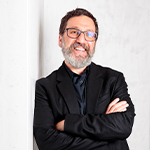We speak to Dr Timothy Sharp, Chief Happiness Officer at Sydney’s The Happiness Institute, to find out more on how to keep a healthy and happy perspective during these trying times.

Q: How would you define happiness, especially in this unusual situation we are all in?
Dr Sharp: There are many definitions of happiness, but in simple terms, it can be thought of in one of two ways. Firstly, happiness is one of many positive emotions; along with joy and satisfaction and contentment and even calm. Important as these are, however, they’re fleeting. So secondly, and what the science of Positive Psychology is really more interested in, is that happiness can be thought of as thriving and flourishing; or living one’s best life. This includes the experience of positive emotions but also includes living a life with meaning and purpose, attending to physical health and well-being, fostering hope and optimism, building and maintaining positive relationships, and practising gratitude.
Q: What are the main aspects of happiness that we should all aspire to?
Dr Sharp: We should aspire to live a life that’s consistent with our values. This should contribute to satisfaction and pride, but we also need to accept that we won’t be 100% happy all the time. Doing good usually leads to feeling good but sometimes, say, when bad things happen, we also need to accept and manage (as best we can) the reality of negative emotions. In summary, then, we should aspire to living a “good life” (which isn’t necessarily the same as being “happy” every minute of every day).
Q: What strategies are there to help us cope with difficult situations – be it financial, career, relationships or family?
Dr Sharp: There are too many to comprehensively list here but a few of the top ones are: Keeping things in perspective (that is, remembering that difficult times don’t last for ever); staying focused on what’s really important; taking things one step at a time; taking care of our physical health and well-being (which means prioritising sleep and diet and exercise); focusing more on what’s good not just on what’s not so good and importantly, remember that we don’t have to cope all on our own, so reach out and ask for help where and when you can.
Q: People have been complaining about the lack of social activity and even overseas travels and holidays – a dearth of ‘happy’ experiences. Are these essential for personal happiness?
Dr Sharp: They usually are an important part of living a happy life but the reality is that some of these activities are limited now and might be for some time to come. So, we need to try to find alternatives and create pleasure and fun where and when we can.
 About Dr Tim Sharp
About Dr Tim Sharp
He is the Chief Happiness Officer of The Happiness Institute in Sydney. Dr Sharp is a speaker, consultant, writer and coach and is an adjunct professor at UTS Business School & RMIT School of Health Sciences.
Share your secrets to happiness with us magnsman@sph.com.sg!










